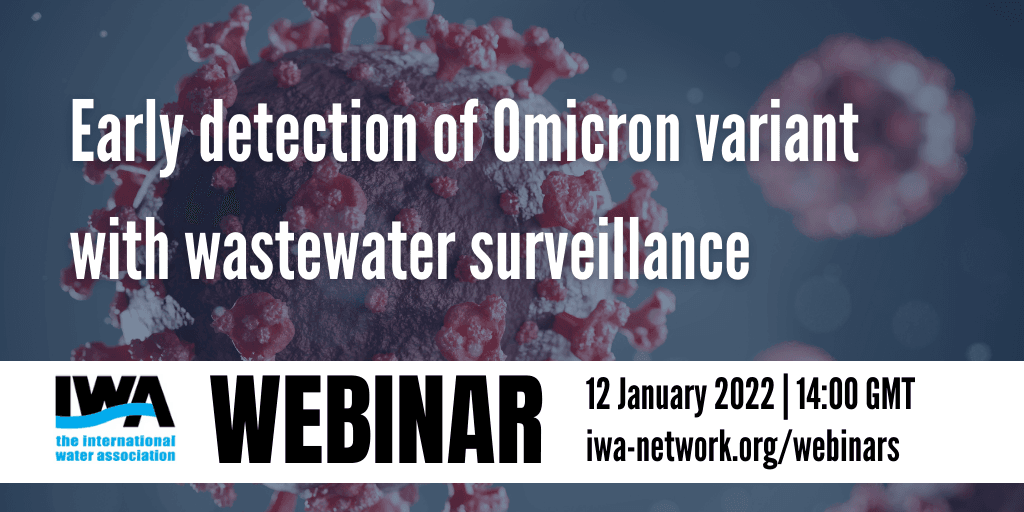Early detection of Omicron variant with wastewater surveillance
Wastewater-Based Epidemiology (WBE) continues to be a valuable tool in predicting COVID-19 outbreaks and the emergence of new Variants of Concern (VOC). The B.1.1.529 variant – designated Omicron – was first reported to the World Health Organisation (WHO) by South Africa. On the 26th of November 2021, the WHO successively designated it as a VOC. Many countries have also reported the variant in their patients, and the detection has coincided with the emergence of the fourth wave in some places.

Starts
Jan 12, 2022
Language
EnglishMember fee: $0.00
Standard fee: $0.00
Webinar Video
Description
Due to a large number of mutations, it is hypothesised that this VOC may result in an increased risk of reinfection, and it is still not clear if vaccines are as effective against it. Current SARS-CoV-2 PCR diagnostics continue to detect this variant, and several laboratories have reported that one of the three target genes is not present.
Based on clinical data trends and the emergence of this variant as a VOC, researchers are using the WBE approach to determine the presence of the Omicron variant in wastewater samples. This webinar aims to share the early successful detection and monitoring of the Omicron variant in wastewater and assist the international community in their efforts to use WBE to track the occurrence and spread of the Omicron variant. This webinar will present the latest methodology and approaches for detecting the Omicron variant in wastewater samples as part of WBE.
Co-Chairs:
Dr. Sudhir Pillay, Research Manager, Water Research Commission, South Africa
Dr. Banu Ormeci, Professor and Jarislowsky Chair in Water and Global Health, Department of Civil and Environmental Engineering, Carleton University, Canada
**Webinar Resources
**
Previous webinar on-demand: Traditional and molecular indicators to characterise sewage in WBE
Blog article: Variants, Wastewater-based epidemiology and data sharing
Scientific journals articles:
Droplet digital RT-PCR to detect SARS-CoV-2 signature mutations of variants of concern in wastewater
Quantification of SARS-CoV-2 variant mutations (HV69-70, E484K/N501Y, del156-157/R158G, and Del143-145) in settled solids using digital RT-PCR V.3
SARS-CoV-2 RNA in Wastewater Settled Solids Is Associated with COVID-19 Cases in a Large Urban Sewershed
High-Frequency, High-Throughput Quantification of SARS-CoV-2 RNA in Wastewater Settled Solids at Eight Publicly Owned Treatment Works in Northern California Shows Strong Association with COVID-19 Incidence
Panelists
Prof. Joan Rose, https://www.canr.msu.edu/people/joan_rose Professor at Michigan State University, United States (moderator)
Dr. Warish Ahmed, https://people.csiro.au/A/W/Warish-Ahmed Senior Research Scientist at Commonwealth Scientific and Industrial Research Organisation (CSIRO), Australia
Dr. Gertjan Medema, https://www.kwrwater.nl/en/experts-expertises/experts/gertjan-medema/ Principal Microbiologist at KWR, the Netherlands
Dr. Alexandria Boehm, https://cee.stanford.edu/person/alexandria-boehm Professor of Civil and Environmental Engineering and Senior Fellow at the Woods Institute for the Environment, Stanford University, USA
Dr. Aaron Bivins, https://www.linkedin.com/in/awbivins/ Assistant Professor in Civil & Environmental Engineering, Louisiana State University, USA
Dr. Jesper Gamst https://www.linkedin.com/in/jesper-gamst-a835478/?originalSubdomain=dk Managing Director, Eurofins Environment Testing, Denmark
Target Audience
Universities, public and private research and testing laboratories, public health sector, municipalities, wastewater treatment plants.
Learning Objectives
After this webinar, participants will be able to:
- Gain an understanding of the use of wastewater-based epidemiology (WBE) for monitoring COVID-19
- Understand how to detect emerging variants of concern with WBE
- Understand Omicron variant detection in wastewater as it relates to observations from clinical samples